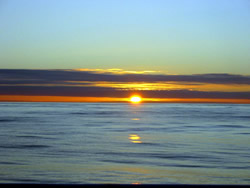|
Cruise
Summary
Bill Chadwick, Chief Scientist

Sunset
at sea from the R/V Thomas Thompson. |
|
The NeMO 2004 expedition has been a great success,
thanks to good
weather, the hard work of the science party, and excellent support from
the ROPOS group and the crew of the Thompson. Here’s a brief summary
of
our results this year:
1)
We made 5 ROPOS dives at Axial Volcano this year and had one full day
of instrument deployments and recoveries. Between dives we conducted 6
CTD (conductivity, temperature, and depth) casts or tows to survey the
hydrothermal plumes in the water above the bottom. In addition we
collected EM300 multibeam sonar data to update and extend our survey of
the bathymetry around the volcano.
2)
Two of the ROPOS dives were devoted to collecting fluid samples from
hydrothermal vents at Axial for chemical and microbiological analysis.
We sample many of the same sites each year to look for changes that
might be signal changes in the behavior of the volcano. Some of the
hydrothermal vents showed temperature decreases this year. The Marker
33 vent looks about the same as last year, but nearby Cloud vent
definitely had reduced temperature and flow. The ASHES vent field looks
about the same, but one of the vents there, Virgin, seems to have a
lower temperature than in previous years.
3)
We made our ROV-based pressure measurements at five seafloor
benchmarks again this year, in order to look for volcano inflation at
Axial. This year we made some changes to the way we collected the
pressure data and we were able to improve our repeatability at each site
by about an order of magnitude (9 mm this year vs. 7 cm last year)! The
data show that all the stations in the caldera were uplifted since last
year and the center of the caldera continues to go up at a rate of about
20 cm/yr.
4)
The NeMO Net buoy and the Remote Access Sampler (RAS) were replaced,
but we are taking the new Bottom Pressure Recorder (BPR) back with us
because it was having data transmission problems. Hopefully, it can be
fixed and redeployed during another expedition soon. The RAS that was
put down last summer worked perfectly and was full of vent fluid samples
when we recovered it.
Overall,
our monitoring shows that Axial Volcano continues to gradually
build up toward its next eruption, but we do not know exactly when that
next eruption will happen. We continue to monitor the volcano and its
hydrothermal sites with the aim of anticipating future activity and
documenting the changes that occur when that eruption finally occurs
|

